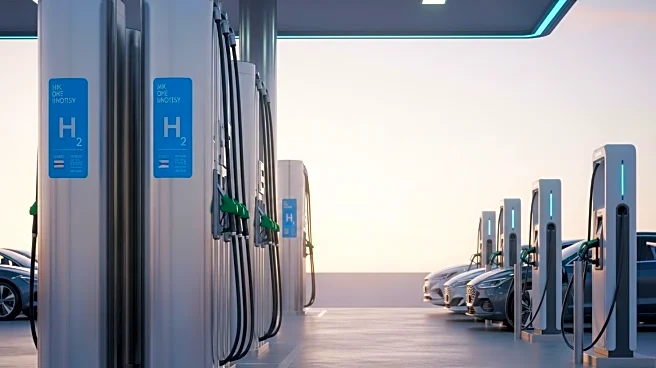What's Happening?
South Korea's ambitious hydrogen transportation program, initiated in 2019, aimed to replace all 802 police buses with hydrogen fuel cell models by 2028. However, by the end of 2025, only 16 hydrogen buses are operational, with the police deciding not to purchase more due to insufficient fueling infrastructure. Despite significant investments, the program has struggled with unreliable fueling stations and high costs, leading to a practical end of the initiative. The decision by the police marks a significant shift away from hydrogen transportation, highlighting the challenges faced in scaling hydrogen infrastructure.
Why It's Important?
The failure of South Korea's hydrogen transportation program underscores the broader challenges facing hydrogen as a viable transportation solution. The high costs and unreliable infrastructure have led to a preference for battery electric vehicles (BEVs), which are seeing increased adoption due to lower costs and better reliability. This shift has implications for global transportation strategies, as countries reassess the feasibility of hydrogen versus electric solutions. The decision by South Korea's police force may influence other stakeholders to reconsider their investments in hydrogen technology, potentially impacting the future of hydrogen in transportation.
What's Next?
The decision by South Korea's police force to abandon hydrogen buses could lead to a reevaluation of national hydrogen policies. Other stakeholders, including provincial governments and companies, may follow suit, shifting focus to battery electric vehicles. This transition could accelerate the development of BEV infrastructure and technology, further diminishing the role of hydrogen in transportation. The global trend towards BEVs may continue to strengthen, influencing transportation policies and investments worldwide.
Beyond the Headlines
The shift away from hydrogen transportation in South Korea reflects a broader evolution in energy strategies. As societies test new technologies, the practical and economic realities often dictate the direction of innovation. The challenges faced by hydrogen transportation highlight the importance of reliable infrastructure and cost-effective solutions in shaping future energy policies. This development may prompt a reassessment of hydrogen's role in other sectors, such as industrial applications, where it may still hold potential.












